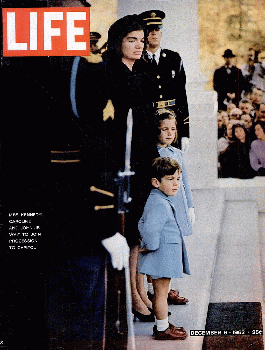
LIFE Magazine 6 Dec 1963 - PRESIDENT KENNEDY IS LAID TO REST - Tang l... TT Kennedy 25-11-1963
(Image by manhhai from flickr) Details DMCA
It all began with an assassination 61 years ago.
That Day
On November 22nd of 1963, almost exactly two months after my wife and I were married at the University of Minnesota, I was in the midst of a Shakespeare class on the University of Minnesota campus when the assassination of JFK was announced. Everyone was shocked; the air was thick with disbelief. The usually bustling campus was eerily quiet as I walked home, my mind reeling, trying to comprehend the gravity of what had just happened.
My wife had been teaching a class of elementary students in one of the Minneapolis public schools, trying to keep things calm. When she arrived home, she joined me in front of the TV in our apartment near campus, and we watched for the next several days as we, with the rest of the nation, tried to make sense of the assassination and mourn a fallen leader, who represented such renewed hope for the nation.
Since that day our nation has slowly been taken on another path, one that is much more focused on the needs of an economic elite, with changes in the tax code, the weakening of collective bargaining for unions and the pro-business Supreme Court rulings, while deemphasizing the needs of the ordinary citizens of our democracy.
This shift, which might have been labeled a conspiracy had it come from the liberal left, was instead described as a 'good business plan' by its conservative architects. Those conservative elements that represented that economic elite encompassed businesses, corporations, the military-industrial complex and the secret elements of our nation that covertly support their bidding in the name of National Security.
None of this was very apparent to most of us at that time, except that the Warren Commission report left too many questions unanswered: the inconsistencies of eyewitness testimony, the one-assassin theory, the one-bullet theory, and the kill shot coming from the back, all of which challenged our common sense. As time went on it became clearer that the official explanation of that assassination was as much a cover-up as a real investigation.
A Journalist's Warning
A couple of years later in 1965/1966 as I found myself teaching high school in a small town in Michigan, my wife and I were invited to a dinner by some friends and at that dinner was a journalist who had recently returned from Vietnam. He described the assassinations that the CIA operatives were carrying out in Vietnam. After hearing what he was saying, I said, "Well what would happen if the CIA began to do that here?' His answer was, "What makes you think they haven't?" That totally stopped the conversation as his response began to sink in.
The Motivation for the Quiet Coup
The quiet coup was, in reality, a plan to reestablish control over the levers of government in the US by the economic elite that had dominated government since the very beginning of this nation. With the coming of FDR and his New Deal, control of those levers had been shifted to be more democratically controlled by the citizens of the nation. In other words, the purpose of government had shifted to be in service of the citizens rather than being in service to business and the economic elite. But the new plan of that economic elite was to shift the focus back to economics, deregulating business with new economic and tax programs and solidifying that control so as never to lose it again.
The economic elite hated FDR and fought the New Deal, tooth and nail, with the help of a very conservative Supreme Court. That economic elite began to gradually reclaim some of their dominance by the end of FDR's administration. That process continued under Truman and seemed to begin to be solidly reestablished under Eisenhower, but the election of JFK appeared to jeopardize those gains.
As JFK continued in office, it became clear that things were returning to a "New Deal", more democratizing ideology. After the Bay of Pigs fiasco, perpetrated on the new president by the Eisenhower CIA with Alan Dulles as head, Kennedy fired Dulles and was about to dismantle the CIA. Later, Kennedy was beginning to pull out of Vietnam, and after the Cuban Missile Crisis, had found ways to perhaps end the Cold War by finding a de'tente with Russia and Cuba. All of these things began to look like a return to the democratizing elements of the New Deal, a possible end to the Cold War and potentially an end to the dominance of the economic elite once again.
After the JFK assassination, as we all know, the war in Vietnam continued for several more years, to the benefit of the military-industrial complex, the power of the CIA continued, the possibility of a de'tente with Russia and/or Cuba dissolved, and the Cold War with its arms race, continued to be the focus of our foreign policy. And, to top it all off, Alan Dulles was part of the Warren Commission.
The Beginning of the Quiet Coup
(Note: You can view every article as one long page if you sign up as an Advocate Member, or higher).





